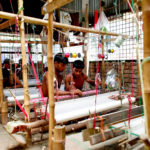In India, only 20% of women participate in the labour force—less than in Bangladesh and Saudi Arabia—hampering national economic growth and women’s financial independence. This project investigates how safe public transportation, specifically the Delhi Metro, can alleviate mobility constraints that keep 60% of working women within 2km of their homes. We leverage past and future…
Employment
Education and Labour Market Dynamics in a Period of Rapid Education Expansion:
Recognizing the need for policies that address poverty and inequality and build social cohesion, the Ghanaian government rolled out free compulsory primary education in 1996 and free senior high school provision in 2017. With the first cohorts exposed to the free education policies now reaching prime adulthood, our project aims to take stock of how…
Market-Based Solutions to Gender Inequality in Job Search in Pakistan
Our research agenda addresses questions central to the economics of gender: To what extent are gender gaps in labour markets driven by labour demand versus supply? Given weak capacity in developing countries to enforce legislation, can market-based interventions help redirect the search of workers and firms towards more equitable matches? We leverage our research partnership…
Assessing the Impact of the Shock on the Most Vulnerable
The COVID-19 pandemic poses a particular challenge for low-income and fragile countries, as well as vulnerable groups, particularly women. Our Sudan Labor Market Panel Survey (SLMPS) 2020 project, with planned data collection starting in August/September 2020, has benefited from support from the GLM | LIC project. The study proposes additional data collection and research on…
Working Together or Never: Women’s Labour Supply Externalities and the Unemployment Trap
When social networks generate redistributive pressures, labor supply decisions are undertaken in a social context. Individuals who optimize labor supply do so with the understanding that some of their earnings may be subject to taxation within the network; if they are capable of avoiding this tax by not working, then labor supply will be distorted…
Can Temporary Financial Incentives for Female Industrial Workers Lead to Long-Term Retention and a Better Allocation of Talent?
In this project, the research team study whether worker turnover contributes to the misallocation of talent in low-income countries. To this end, they will experimentally evaluate the impacts of offering financial incentives for worker retention in the context of a female-dominated occupation in the nascent garment manufacturing industry in Ethiopia. Our main hypothesis is that…
The Roles of Information and Search Frictions in Determining Working Conditions in Bangladesh’s Apparel Sector
The emergence of low-skill manufacturing sectors in developing countries can increase labor market opportunities and provide other economics benefits for women (Heath and Mobarak, 2015; Tanaka, 2017). But in light of the poor conditions that characterize many low-skill manufacturing sectors, some researchers have questioned whether manufacturing jobs are actually better for workers than their alternatives.…
Whistleblowing and Worker Wellbeing: Evidence from Bangladesh’s Garments Sector
In many developing countries, the private sector lacks monitoring systems to provide firms with incentives for good behavior. In part, this problem is due to weak, sometimes corrupt state institutions (Dal Bó and Finan, 2016). In part, it may also be due to principal-agent problems within the firm and to limited organizational capacity (Bloom et…
Differential Earnings, Household Division of Labour and Fertility Choices: An Application of the “Doing Gender” Hypothesis in Ghana
The project aims to examine the evidence for the “Doing Gender” hypothesis in Ghana. We examine whether greater earnings by Ghanaian women is associated with increased household bargaining power, proxied by the division of housework between a woman and her husband. The study is relevant as the issue of the division of domestic work has…
Overcoming Constraints to Female Labour Force Entry
We propose a randomised controlled trial to test the impact of two low-cost interventions to overcome psychological and information constraints to female labor force participation (FLFP). Our research questions are, does (i) motivating female students and (ii) providing information about the job market, promote female labor force entry, as measured by their likelihood of applying…









